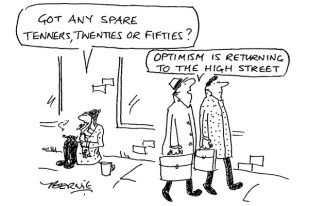For the love of Mike, was he in a coma? Dead? It took a few more painful moments of this boilerplate obituary and Mitchell’s palpable grief for it to sink in: ‘King David’ had done something bad — an extramarital affair! — for which he apparently took responsibility, and so he had immediately resigned his post.
Over the next days, the scandal spread. General John Allen was at it too, allegedly, sending ‘potentially inappropriate’ emails. Two women emerged from the flurry of news, the jezebels who’d led our brave generals astray: Petraeus’s biographer, Paula Broadwell, and a socialite from Tampa, Jill Kelley. David and Paula had had an affair, but then Paula had become jealous of Jill, who had been flirting with John… Suddenly the whole chain of command started to look like a bad soap opera.
It’s difficult to explain to a British reader how much America has worshipped Petraeus. After Friday’s news, the media was in mourning. Black clouds passed over the sun and the birds refused to sing. The sycophantic press rushed to remind us of his past glories, talking of the man’s incredible ‘popularity’ among the troops, his heroism, his intellectual vigour and genius. A parade of pundits referred to Petraeus’s resignation as ‘terribly sad,’ a ‘tragedy’, and I even heard a few blurt out ‘sacrifice’, as though he was climbing up onto the cross.

US senators were wandering around dazed and confused on Friday. Dianne Feinstein, acting like she had just discovered that her favourite teen dream idol was a crackhead, talked about the news as being a ‘lightning bolt’ to the system, and a ‘heartbreak’. ‘I would have stood up for him,’ Feinstein declared, ever loyal. ‘I wanted him to continue.’ Meanwhile, Sen. John McCain, always on point, issued a brief talisman of a statement for Petraeus, harking back to the good old days when the General helped to sell the war on which McCain and other hawks had staked their political lives.
‘General David Petraeus will stand in the ranks of America’s greatest military heroes,’ he bloviated. ‘His inspirational leadership and his genius were directly responsible after years of failure for the success of the surge in Iraq.’ As the dust continued to settle on Monday, it was clear that Petraeus’s disciples weren’t going to let his reputation go without a fight. His followers on and off Capitol Hill have effectively connected his resignation to the upcoming Benghazi hearings, and all manner of conspiracy theories abound — the greatest being that he was somehow framed by the administration in order to keep him from testifying. This is such a popular theory that there have been calls to investigate the FBI for investigating Petraeus.
The acolytes created an atmosphere in which Petraeus was the Don Draper of the Pentagon
So who is the real Petraeus? Now, at least, good questions are being asked about the rise of the man they called ‘P4’. (A reference to his four-star general status). How did an officer with no personal experience of direct fire combat in Panama or Desert Storm become a division commander in 2003? Why did we promote a man who just shamelessly reinforced whatever dumb idea his superior advanced, regardless of its impact on soldiers, let alone the nation? How did a man who served repeatedly as a sycophantic aide de camp, military assistant and executive officer progress so far? Many in and out of uniform warned against the famous ‘surge’, which in the end did nothing but provide cover for our retreat from Iraq. How was it that this same man repeated the same self-defeating tactics in Afghanistan?
There were plenty of people who had warned that Petraeus was a fraud from the start, a politically-driven, class-A narcissist. But it is becoming clear that the public was protected from the real Petraeus by his now infamous ‘inner circle’: neoconservative think-tankers, fawning scholars, court scribes, and officer acolytes like the ill-fated Gen. Stanley McChrystal and John Nagl. Also, of course, his future paramour and biographer, Paula Broadwell. All of these played some role in overstating the impact and brilliance of the surge in Iraq, and of the COIN (counterinsurgency) doctrine.
As time went by, P4’s fans rose through the ranks and became ever more influential. They created an atmosphere in which David Petraeus was the Don Draper of the Pentagon, a general who reporters would leap out like hellcats to defend.
One of the most interesting effects of the last few days is that the cult of Petraeus is finally beginning to unravel. Journalists are admitting they were duped, sucked in along with the rest of the courtiers and counter-insurgency ‘experts’ perpetuating the positive war narrative. Wired’s Spencer Ackerman probably offered the most poignant and honest lament in this regard, in an article called ‘How I Was Drawn Into the Cult of David Petraeus’. Ackerman was never one of the greatest offenders. Still, he suggests that Petraeus and his staff were masters at handling the press, whose subtle methods played upon reporters’ thirst for access and their unabashed awe (and sense of inferiority) in the military milieu, which resulted in unquestioning write-ups.
‘To be clear,’ writes Ackerman, ‘none of this was the old quid pro quo of access for positive coverage. It worked more subtly than that: the more I interacted with his staff, the more persuasive their points seemed. Nor did I write anything I didn’t believe or couldn’t back up — but in retrospect, I was insufficiently critical. Another irony that Petraeus’s downfall reveals is that some of us who egotistically thought our coverage of Petraeus and counterinsurgency was so sophisticated were perpetuating myths without fully realising it.’
But what does the whole saga say about the American public? Well, at first blush, I’d say we deserved every single second of this painful, tawdry realisation. We’ve turned into such a pathetic plastic consumer culture that we bought a pathetic plastic story of a hero-general and then expected great things from him. We looked away when Petraeus did not perform — even made excuses for him (it was all President Obama’s fault). Even now, after his admission that he cheated on his wife of 37 years with a married woman and mother of two young sons, we will continue to make excuses, because it will make us feel better about what suckers we’ve all become.






Comments